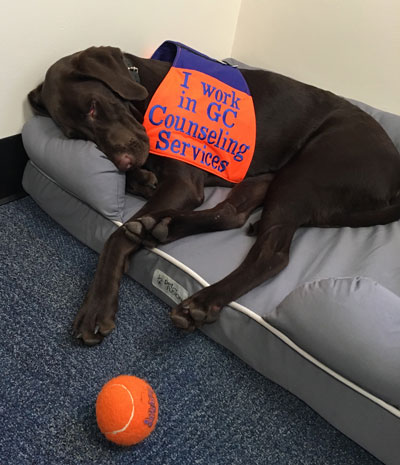Counseling Services Offers New Online Mental Health Resources

Zach, the emotional support dog in the Counseling Services office (Photo courtesy of Gettysburg College)
By Sarah Kirkpatrick, Staff Writer
As student demand for mental health resources grows on campus and nationwide, Gettysburg College Counseling Services has added two new online self-help programs to their website. The first of these programs, Therapist Assisted Online (TAO), is a software designed to help users with moderate anxiety or other mental illnesses to manage their emotional wellbeing through psychoeducation and guided exercises. The program is free for anyone with a Gettysburg.edu email to utilize anonymously after creating an account.
TAO combines wellness surveys, video exercises, and other media into a variety of self-help modules on different topics. These modules focus on themes like interpersonal skills, mindfulness and relaxation strategies, and resilience training, which can improve a person’s ability to recover from setbacks.
“We are excited to be able to explore different tools that can be of help to our community and we’re eager to assess how people respond to TAO,” said Counseling Services Director Dr. Kathy Bradley, “What is especially great about TAO is students who want help but cannot or choose not to go to Counseling Services can still access evidence-based self-help – anytime, anywhere.”
Although TAO is designed to work without the help of a counselor, it can be used as a supplementary resource between or even as part of traditional therapy sessions. Bradley envisions the software as having a lot of potential, even musing about integrating it into a future first year seminar course.
The second new tool available to students is an online training program called “Ask Listen Refer” intended to help users learn to recognize and respond to others who might be considering suicide. The program takes around 25 minutes and includes video demonstrations of how to speak with someone may be having suicidal thoughts.
These self-help resources will provide vital mental health support to students who sometimes find it difficult to obtain counseling appointments as demand for these sessions continues to increase. According to Bradley, about 25 percent of Gettysburg College students visit Counseling Services each year, which mirrors trends at other colleges nationwide. She attributes this shift to rising levels of stress and perfectionism among young adults as well as improved advertising for counseling programs.
“There are so many stressors for students, especially at our college where there is so much focus on academics,” explained Rebekah Grimes ‘20, “It can really get in your head with so many things riding on your GPA. Until recently, there hasn’t been enough understanding by colleges that this is important.”
Anxiety is a particularly common disorder among these undergraduates, with the American College Health Association reporting that nearly one in six college students have been diagnosed with or treated for it within the last year. TAO’s anxiety treatment modules will offer these individuals needed coping strategies, especially if they cannot or do not want to make an appointment for in-person treatment.
“When I wanted to deal with my personal anxiety, I was given a worksheet to break it down by getting to its real source and rationalizing the situation, so I didn’t feel anxious anymore,” explained Timothy Black ’20, “I thought it was very helpful.”
The idea is that TAO will be able to offer similar exercises for users to better understand their anxiety. However, for many students, these resources are not a substitute for meeting with a therapist.
“If you’ve dealt with mental health issues before and you want to refine and work on the coping mechanisms you’ve learned, then these resources could be helpful,” said Grimes. “I think, though, that if you’re a first-time mental health sufferer, you need to see someone. There is no beating an in-person session.”
For those seeking to meet with a therapist, Counseling Services can typically fit students in for an appointment within a week and a half for non-emergency situations and within the day in the case of an emergency. Services are confidential and at no additional cost for students. They also include a chance to interact with Zach the therapy dog for extra emotional support.
In the future, Bradley plans to continue expanding the scope of mental health resources available to the campus community. Specifically, she hopes to add more therapists to the Counseling Services team in the future as the need for treatment continues to climb.
